James Brown
July 17, 2012
Conferences and Workshops, Events, Podcasts, Project Updates
Tags: England, France, John Wallis, Martin Lister, Networks, Pierre Bayle, Pierre des Maizeaux
Convened by Philip Beeley and Martine Pécharman, the workshop is a letter-specific installment of the MFO’s ongoing series Across the Channel: Intellectual Relations between England and France in the Early Modern Period, and will feature epistolary talks from Antony McKenna (on Pierre Bayle), Anna Marie Roos (on Martin Lister), and Ann Thomson and Sébastien Drouin (on Pierre des Maizeaux). The workshop will be held at the Maison, and there’s no need to register; for further details, please visit the workshop webpage.
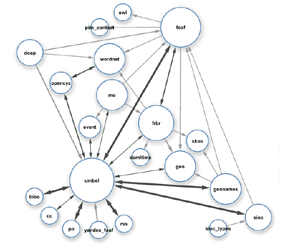 Following on from our participation in a Wikimedia-sponsored data workshop back in April, our technical director Neil Jefferies has published an excellent opinion piece on Representing Knowledge: Metadata, Data, and Linked Data in the latest issue of The Signpost, the community-edited newspaper covering Wikipedia and the Wikimedia Foundation. Neil draws on his extensive experience of knowledge management in both the commercial and academic library sectors to make a convincing case for flexible and non-prescriptive data models. Go read it!
Following on from our participation in a Wikimedia-sponsored data workshop back in April, our technical director Neil Jefferies has published an excellent opinion piece on Representing Knowledge: Metadata, Data, and Linked Data in the latest issue of The Signpost, the community-edited newspaper covering Wikipedia and the Wikimedia Foundation. Neil draws on his extensive experience of knowledge management in both the commercial and academic library sectors to make a convincing case for flexible and non-prescriptive data models. Go read it!
Kim McLean-Fiander
July 02, 2012
Events, Lectures, Podcasts, Project Updates, Publications
Tags: Cryptography, Editions, Elizabeth Stuart, Gender, Military History, Politics, Women
 Podcast available on the seminar page!
Podcast available on the seminar page!
Elizabeth Stuart, Queen of Bohemia (1596-1662) has often been portrayed as a romantic and frivolous figure; as a desperate, poverty-stricken, devout widow, or as a dilettante who spent her time going to ballets and masques and keeping the company of monkeys (which she allegedly enjoyed more than that of her children). A key constituent of these narratives has been the assumption that her political influence within Europe was negligible.
However, as Nadine Akkerman of Leiden University argued in her paper in our seminar series on 24 May (Opening up the Winter Queen’s Cabinet: The Correspondence of Elizabeth Stuart, Queen of Bohemia), this is a distorted and partial perception of the monarch that has largely arisen because historians have tended to overlook her vast correspondence. The fact is that Elizabeth’s nearly 1700 surviving letters from forty-seven archives in Europe and the US (estimated to be a mere 10% of what once existed) − which Nadine is editing for OUP − contain almost no information on her cultural life, and very little mention of plays, artists, or poets. They reveal instead that she was immersed in politics and was a keen follower of military affairs. Indeed, the underlying purpose of nearly all of her letters, Nadine argued, was to regain the lost Palatinate lands for her heirs.
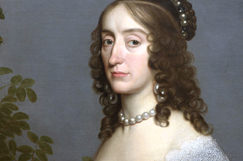
Elizabeth, Queen of Bohemia
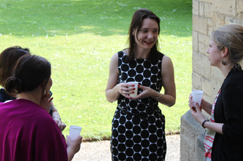
Nadine fields questions over drinks.
In a stimulating and wide-ranging analysis, Nadine discussed the often ignored, though politically important, roles of royal secretaries, scribes, and letter carriers. She traced the various ways by which Elizabeth attempted to outwit her brother Charles I’s surveillance of her correspondence (by using cryptography and steganography, for example), and suggested that Elizabeth used letters as a polite instrument by which to sabotage her brother’s plans for the Thirty Years War, thus making that event last ten years longer than it might otherwise have done. In sum, Nadine posited that an examination of this important though neglected correspondence should bring about an overdue reconfiguration of the Queen of Bohemia’s pivotal role in seventeenth-century diplomatic, military, and political history.
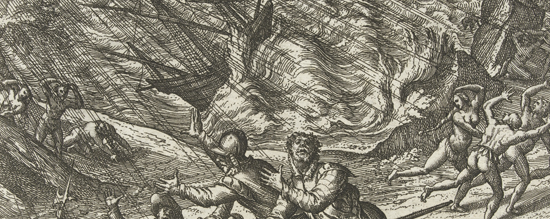
Here in the British Isles, summer is living up to its reputation: that is to say, we’re armed with umbrellas, and battling wind, rain, and flood on a daily basis. Indeed, a seasonal dip into EMLO reveals that heavy rainfall from May to September was not such an unusual occurrence.
Seventeenth- and eighteenth-century summers saw floods the length of the Cherwell valley. There were thunderstorms, whirlwinds and panic-stricken haymakers, damaged crops, stormy summer nights, as well as danger and disruption to transport. There were stiff August winds in the Solent and delays with naval manoeuvres on account of storms in the Channel. The summer of 1682 seems to have been especially wet. Magistrate Edmund Warcup laments the effects of rain on his corn and grass, of floods on his fields and livestock – the poor chap lives in fear of cattle rot – and is forced to take action against the deluge. On 9 May of this same year, clergyman William Jenkyn wrote to Philip Wharton to warn him that ‘the floods are out so bad between Uxbridge & London that it is very dangerous to travel so advises his Lordship to postpone his journey’.
Thus, although all was not gloom and doom during these seasonal soaks (James Long informs John Aubrey that lamprey eels are ‘plentiful in flood time’), it’s small wonder that the time-honoured cliché of sodden summers came into being. As we forego sandals and shorts for galoshes and gumboots, it’s worth reflecting that our ancestors may have been thankful for cold, wet summers as, with the heat in cities, came plague (more on that in a future post), and fine weather was not a cure for all ills. On 6 June 1677 Robert Digby wrote to Thomas Smith that he hoped to see him at the next sitting of Parliament ‘if I can get rid of my cough which wears away, God be thanked, very much this kind weather’, yet favourable temperatures did not work magic in this case; the poor young man was dead by the end of the year.
Miranda is editing metadata from the Bodleian card catalogue of correspondence for our union catalogue, Early Modern Letters Online. On a regular basis, she brings us hand-picked and contextualised records.
James Brown
June 12, 2012
Events, Lectures, Podcasts, Project Updates, Websites and Databases
Tags: Digitization, Editions, Electronic Enlightenment, France, Mapping the Republic of Letters, Networks, Text Mining, Visualization
 Podcast available on the seminar page!
Podcast available on the seminar page!
In the fourth paper of our seminar series on Thursday 17 May, Dr Glenn Roe – formerly of the University of Chicago, and current Mellon Fellow in Digital Humanities at Oxford’s OERC – gave a sophisticated and suggestive paper on ‘Text-Mining Electronic Enlightenment: Influence and Intertextuality in the Eighteenth-Century Republic of Letters’.
.
Building on his recent work with the Electronic Enlightenment corpus and other online repositories of long-form historical text, Glenn started his talk by observing the irony that the recent efflorescence of big data, culturomics, network analysis, and other quantitative approaches to culture – focusing in many cases on the macro interpretation of metadata over content – has authorized and promoted a convention of ‘not reading’ within the digital humanities, in which historical texts themselves can be marginalized or effaced altogether by the superabundance of information. The ready modelling of letters as a finite number of abstract datapoints (sender, recipient, and so on) and the vast quantities of diverse and often disorganized information exchanged within epistolary systems makes correspondence highly susceptible to such an approach.
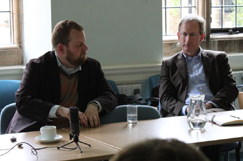
Glenn during discussion.
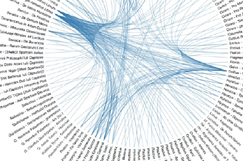
Visualizing influence.
As a supplement to this ‘distant’ reading, Glenn went on to demonstrate the potential of the latest machine-learning technologies to render significant volumes of transcription meaningful via text mining and the automated creation of patterns, frequencies, statistical models, and other forms of ‘mediated’ or ‘directed’ reading. Glenn distinguished between three kinds of text mining: predictive classification (used to generate new categories from unprocessed texts); comparative classification (used to correct and refine existing categories within processed texts); and similarity (used to measure broader similarities between documents and parts of documents, especially in terms of the identification of meaningful borrowing and instances of intertextuality). He then demonstrated each kind of approach within a rich series of examples drawn from his work with the ARTFL Encyclopédie Project, and most recently Electronic Enlightenment, before concluding his analysis by presenting – with caveats – some preliminary radial visualizations of textual influence generated using the D3 JavaScript library.
Applications are invited for TWO AHRC Collaborative PhD studentships, commencing in autumn 2012, on the theme of Reconnecting Sloane: Texts, Images, Objects:
- Collecting and Correspondence: Sloane’s Papers and Scientific Networks (Supervised by Dr Arnold Hunt, British Library and Dr Anne Goldgar, King’s College London)
- Putting Nature in a Box: Sloane’s Vegetable Substances (Supervised by Dr Charlie Jarvis, Natural History Museum, and Professor Miles Ogborn, Queen Mary University of London)
- A third Doctoral studentship in the programme, Visualizing Natural Knowledge: Sloane’s Albums of Natural History Drawings (Supervised by Dr Kim Sloan, British Museum, and Dr Elizabeth Eger, King’s College London) has already been allocated to a named student.
Further particulars are available here (doc). Applicants can apply for both studentships, but must complete separate applications for each as outlined below.
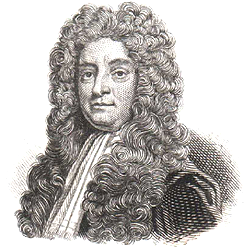 These studentships will focus on the collections of Sir Hans Sloane (1660-1753), which are now divided between the British Museum, the Natural History Museum and the British Library. The research projects will explore various aspects of Sloane’s collections in order to understand how his collecting practices were involved in the making of Enlightenment knowledge. The successful applicants will be expected to work closely with the partner institutions, and each other, in order to draw out the intellectual and material connections between the different parts of Sloane’s collections. They will also participate in the development of new finding-aids for the collections, leading to innovative forms of public engagement.
These studentships will focus on the collections of Sir Hans Sloane (1660-1753), which are now divided between the British Museum, the Natural History Museum and the British Library. The research projects will explore various aspects of Sloane’s collections in order to understand how his collecting practices were involved in the making of Enlightenment knowledge. The successful applicants will be expected to work closely with the partner institutions, and each other, in order to draw out the intellectual and material connections between the different parts of Sloane’s collections. They will also participate in the development of new finding-aids for the collections, leading to innovative forms of public engagement.
The award pays fees and an annual maintenance grant (currently £15,590 per year) and the partner institution will contribute up to £1000 pa research costs. The usual AHRC eligibility rules (pdf) apply to these studentships, including having an appropriate master’s degree by October 2012 and AHRC’s residential requirements.
For both studentships the closing date is 29 June 2012. Interviews will be held in London on 19 July 2012. Applicants will need to include a CV, two references, an academic transcript, and a 1000-word statement of purpose.
Update: Podcasts now available!

 Following on from our participation in a Wikimedia-sponsored data workshop
Following on from our participation in a Wikimedia-sponsored data workshop 

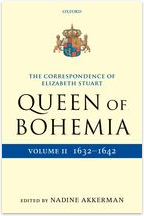




 These studentships will focus on the collections of Sir Hans Sloane (1660-1753), which are now divided between the British Museum, the Natural History Museum and the British Library. The research projects will explore various aspects of Sloane’s collections in order to understand how his collecting practices were involved in the making of Enlightenment knowledge. The successful applicants will be expected to work closely with the partner institutions, and each other, in order to draw out the intellectual and material connections between the different parts of Sloane’s collections. They will also participate in the development of new finding-aids for the collections, leading to innovative forms of public engagement.
These studentships will focus on the collections of Sir Hans Sloane (1660-1753), which are now divided between the British Museum, the Natural History Museum and the British Library. The research projects will explore various aspects of Sloane’s collections in order to understand how his collecting practices were involved in the making of Enlightenment knowledge. The successful applicants will be expected to work closely with the partner institutions, and each other, in order to draw out the intellectual and material connections between the different parts of Sloane’s collections. They will also participate in the development of new finding-aids for the collections, leading to innovative forms of public engagement.
 Join
Join 